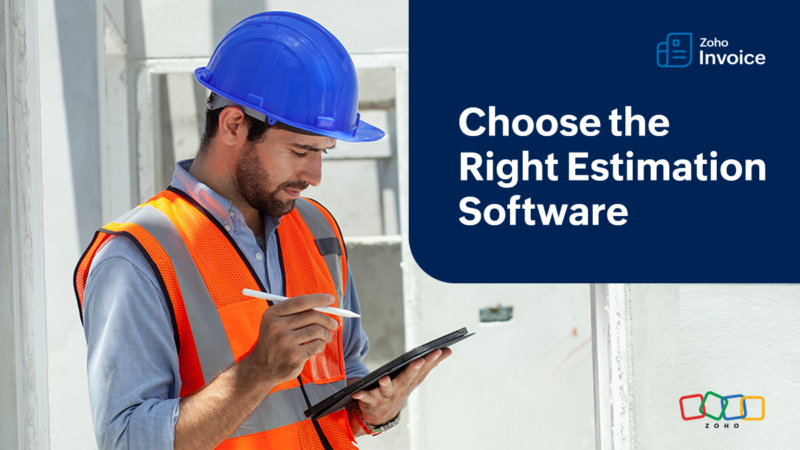- HOME
- Invoicing operations
- How To Choose The Right Estimation Software For Your Business: Guide For Small Business Owners
How To Choose The Right Estimation Software For Your Business: Guide For Small Business Owners
Sarah is an ambitious entrepreneur running her own construction company with big dreams to expand her business. However, with each new project, she finds herself battling unique challenges that crop up, from unforeseen labor cost increases to fluctuating material prices. Sarah used to rely on manual calculations, gut instincts, and guesswork while quoting a price, and old-fashioned spreadsheets to track estimates. However, as her business expands, she realizes the need for a more sophisticated yet simple tool that can help her estimate her project costs.
Is this relatable? Do you find yourself in a similar situation, making manual adjustments to estimates mid-project?
If so, it is high time you shifted to an estimation tool that helps you create accurate estimates so you can keep projects within budget, improve profitability, and cultivate good client relationships.
With the number of estimation tools available online these days, each with varying feature pricing, and scalability options, choosing one can feel a little too overwhelming. This guide can help you find the right estimation tool based on your specific business needs and requirements. We will take a deep dive into key features to look for and integrations you might need without compromising your bottom line. We'll also consider the right pricing structure for your project needs, and its ability to scale as your business scales.

Factors to consider when purchasing estimation software
Assess your business needs and goals
Understanding your unique business needs and goals is the first step toward finding the right estimation software.
Consider factors such as the industry your business belongs to, the complexity of your projects, your growth plans, and the tools with which you would need to integrate your estimation software.
For example, a construction company with large-scale projects in multiple phases would require estimation software that offers advanced project management features, such as tracking project milestones, managing dependencies, and generating comprehensive progress reports. While a graphic designer working as a freelancer might prioritize an estimation software that allows for easy customization of pricing packages and flexible billing options tailored to their creative services.
Features and functionalities
Assess whether the estimation software covers the essential features you might need on a daily basis, such as creating detailed quotes, tracking expenses, generating reports, and managing client information.
For example, if you are running a small construction company with multiple projects and deadlines, you need estimation software that can keep up with your fast-paced business needs.
You need a software that goes beyond simply crunching numbers. Look for a solution that allows you to create detailed quotes with ease, track your expenses, and generate comprehensive reports.
Another feature you must look for is user permissions or user access. If you are running a business with a team of more than one, user-specific access would allow you to assign tasks, and track progress efficiently. This will also help streamline your estimation process while also ensuring smoother and better collaboration with your team members.
Here's something that probably doesn't need a mention: you need to be able to access your estimation tool on your mobile device. Mobile-based estimate applications are crucial for businesses that are constantly on the go or have teams across multiple locations or working remotely. The estimation software should offer mobile apps or web-based access, allowing you to create and access estimates from anywhere at any given time. This flexibility also ensures you can respond to client requests promptly which in turn improves your client relationships.
Ease of use
In the fast-paced world of small businesses and freelancers, time is a precious commodity. That's why user-friendliness is not just a luxury but a necessity when choosing estimation software. As a freelancer, the last thing you want is to be tangled up in complex software that eats into your valuable time.
Look for an estimation software that has an intuitive interface, requires minimal training, and offers helpful documentation and customer support.
As a small business owner or a freelancer, you don't have time to waste attending lengthy training sessions or pouring over complicated user manuals full of technical jargon. A plug-and-play estimation software will have you up and running from the start, ideally eliminating any need to get in touch with the support team. If you do need to reach out for support, good estimation software must also be supported by good customer service that resolves your queries in the shortest time possible. This enables you to focus on what truly matters: your core business.
Customization and flexibility
Each business has its unique way of preparing estimates, making it crucial for the estimating software to be easily customizable. It shouldn't force you to adapt to the pre-existing templates.
A smart estimation tool is built based on the understanding of different industry standards and methods of estimate preparation.
When an estimation software is designed to cater to diverse industries, offering customization options to fit their specific needs, businesses can tailor the look and feel of their estimates to align with their brand image and communication style.
For example, a construction company may need to include fields for labor rates, material costs, and subcontractor fees, along with formulas to automatically calculate totals and apply markup percentages. The software should be able to accommodate all of that and help streamline tasks such as take-off measurement, production of bills of quantities (BoQ), bid summaries, analytics, and tender preparation. This ability to configure these fields and formulas ensures accurate and detailed estimates that account for the unique factors of each project.
Ease of integration with existing tools
Seamless integration with other essential tools your business already uses can streamline your workflows, improve efficiency, eliminate the need for manual data entry, and reduce errors.
For example, integrating your estimation software with project management software allows you to seamlessly transfer project details, timelines, and resources. This ensures a streamlined workflow from estimation to execution.
By selecting an estimation software that can seamlessly integrate with other tools and systems, you create a unified ecosystem that optimizes your estimating process and sets the foundation for efficient and successful business operations.
Affordability and scalability
Cost-effectiveness is crucial for small businesses and freelancers who often operate with limited budgets. It is important to find the perfect balance between getting your money's worth while not compromising on essential features and functionality.
Look for estimation software that offers a reasonable pricing structure that aligns with your business size and needs. Compare pricing plans, and consider both upfront costs and ongoing expenses, like licensing fees or subscription charges.
While affordability is important, it is just as important to assess the software's scalability to ensure it can keep up with your business growth and increase project volumes without requiring frequent software migrations or upgrades.
It is all about making a smart investment that empowers your business without compromising your financial stability.
Key takeaway
Whether you're a creative freelancer, own a construction company, are a consultant, or own another type of business, the right estimation software can be a game changer. Hence, it requires careful consideration of various factors to ensure the estimation software aligns with your unique needs and sets you up for success.
By evaluating the functionality, customization options, integration capabilities, user-friendliness, affordability, and scalability, you can make an informed decision that maximizes your efficiency, accuracy, and profitability.
Note: Although estimates are interchangeably used with the term "quotes" or "quotations", estimates are more of a rough approximation of the potential cost for a project, giving the clients your best guess, while a quote provides a fixed evaluation in a way that when your client approves the quote, you are obligated to perform the work for the agreed-upon price.
With its user-friendly interface, customization options, integration capabilities, advanced reporting features, affordability, and mobile access, Zoho Invoice emerges as a top choice for small businesses and freelancers, with 35,000+ business owners signing up for Zoho Invoice on a monthly basis.
With Zoho Invoice, you can streamline your estimating process, create professional and customized quotes and invoices, and gain better control of your business finances all for free!
Discover the power of Zoho Invoice and transform the way you estimate!
